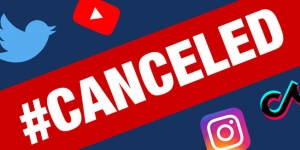Difference between revisions of "Cancel Culture"
| Line 39: | Line 39: | ||
([[Topics|back to index]]) | ([[Topics|back to index]]) | ||
[[Category: Services]] | [[Category: Services]] | ||
| + | [[Category:2020New]] | ||
| + | [[Category:2020Concept]] | ||
<small>Created by David Forystek</small> | <small>Created by David Forystek</small> | ||
Revision as of 12:04, 17 March 2020
Contents
Effects of Being Canceled
There are a wide range of effects that are caused by a person being canceled that can range from a slight buzz on social media and the news cycle about what was said or done, to the person's career being ruined and whatever legacy they left behind, if any, being permanently tarnished. The general public could have a negative opinion about the person and this is where the idea of Groupthink comes into play. With the rise of social media, if a story goes viral about something that was done in the past, it is much easier to just retweet or share it online instead of doing your own research to see if the story has any basis in fact.
Examples
Kevin Hart
In 2018, comedian Kevin Hart faced backlash from fans after it was discovered he had made a series of homophobic tweets dating back to 2009. The amount of backlash both Kevin Hart and the Oscars received put the producers of the Oscars in a difficult position. Hart was asked by the producers to apologize for posting the tweets and as a result, he refused to apologize and stepped down as host of the Oscars.
Johnny Depp
In 2016, domestic abuse allegations were made against actor Johnny Depp by his then wife, actress Amber Heard. This happened at the height of the #MeToo movement, and as a result, Johnny Depp was effectively cancelled and Disney has dropped him from the most recent Pirates of the Caribbean film. In early 2019, details were leaked online of a new lawsuit between Johnny Depp and Amber Heard. The lawsuit detailed abuse the Depp suffered with evidence such as audio clips and surveillance camera video proving the case.
Bill Cosby
Bill Cosby was once a beloved comedian and actor who came to prominence in the early 1960s from stand-up comedy and acting in sitcoms such as The Cosby Show. In 2004, Andrea Constand accused Cosby of sexually assaulting her and filed a civil lawsuit regarding the incident, however the case was settled out of court. Most people forgot about these accusations until 2014 when comedian Hannibal Burress made a joke about Bill Cosby being a rapist during one of his stand-up shows. The video of his joke went viral and prompted a further investigation into the topic. More and more women slowly began coming forward with allegations of sexual assault. His criminal trial began on June 5th, 2017 but ended in a mistrial and a second trial was conducted starting on April 2nd, 2018 and ended on September 25th, 2018 with Cosby being sentenced to 3-10 years in prison. Bill Cosby went from a beloved entertainment personality being nicknamed "America's Dad" to a convicted sexual offender with his career now tarnished forever.
Ethical Issues of Cancelation
Ever since the rise of social media, people have expressed their feelings and opinions on an endless amount of topics. Part of civilization includes sharing opinions and ideas with others, but part of sharing ideas is having people disagree with those ideas. The major problem with cancel culture is the idea that you can just shut down anybody who disagrees with you, no matter the reason. You cannot have civil discourse if you only associate with people who agree with you; instead, you find yourself in an echo chamber of ideas. The principle of freedom of speech is that people can be free to think and say whatever they please, but with cancel culture coming to prominence, people are much less likely to share opinions with others and are more likely to avoid social media all together. Given the inability to freely express opinions is akin to censorship.
What can be done to solve these issues?
Instead of silencing people who are in disagreement, be able to have a civil discussion about the matter. Hearing others' opinions allows for the ability to test our own beliefs, resulting in either a strengthening of one's values or even a change in one's values. Having personal values being tested gives them validity. It is clear that there can be both benefits and consequences to 'cancelling' somebody, and not every situation is black and white; there is always a grey area. Being cognizant of that grey area and welcoming social discourse to test our values is one of the biggest principles of living in a free society.
References
1. Romano, Aja. “Why We Can't Stop Fighting about Cancel Culture.” Vox, Vox, 30 Dec. 2019, www.vox.com/culture/2019/12/30/20879720/what-is-cancel-culture-explained-history-debate.
2. Andrews, Travis. “Kevin Hart Says He's out as Oscars Host after Outrage over Homophobic Tweets.” The Washington Post, WP Company, 7 Dec. 2018, www.washingtonpost.com/arts-entertainment/2018/12/06/kevin-harts-homophobic-tweets-resurface-after-he-is-announced-oscars-host/.
3. Espinoza, Joshua. “Why Some People Are Calling to 'Uncancel' Johnny Depp in Wake of His $50 Million Lawsuit Against Amber Heard.” Complex, Complex, 13 Mar. 2019, www.complex.com/pop-culture/2019/03/reactions-to-johnny-depp-lawsuit-against-amber-heard.
4. ABC News, ABC News Network, abcnews.go.com/Entertainment/bill-cosby-trial-complete-timeline-happened-2004/story?id=47799458.
5. “Is It Time to Cancel the Cancel Culture?” Ethics Sage, 12 Nov. 2019, www.ethicssage.com/2019/11/is-it-time-to-cancel-the-cancel-culture.html.
Created by David Forystek
